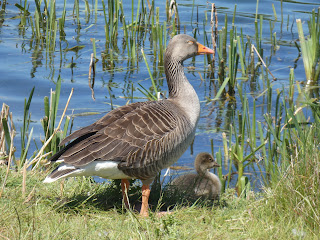As with the pheasant it is difficult to discern whether the greylag geese (Anser anser) one sees in Dorset are truly wild birds. The term feral is probably more accurate meaning according to my dictionary of "existing in the wild having once been domesticated". Two things are certainly true; pure bred greylags do come to the British Isles in winter in severe weather but, like some other species, they rarely venture this far south. Secondly, greylags are the ancestors of virtually all forms of domesticated geese.
It seems likely that the Dorset greylags, then, are descended from farmyard birds that have 'gone wild'! Gradually they have returned to their normal state over generations having lost special features bred into a farmyard species. Geese were once very commonly kept on farms and smallholdings but not so now and so there was plenty of scope for them to wander off.
Even feral greylags are not seen that often in Dorset occurring most often on larger expanses of fresh water. Where they do occur they tend to be resident and living in colonies. Poole Park has a resident population of a couple of dozen for example but at times the numbers there are higher. There is currently a study underway to try and find out more about this particular colony and many birds have been ringed in the hope of shedding some light on their movements.

Comments
Post a Comment